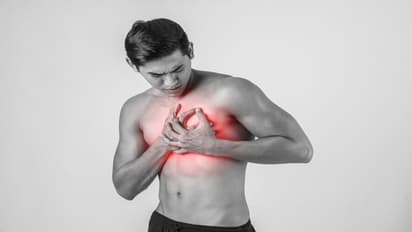EXPLAINER: Dietary recommendations for stroke survivors

Synopsis
Diet for stroke prevention typically involves eating lots of fruits and vegetables rich in antioxidants and flavonoids, lean protein, whole grains, and foods low in added salt.
Diet plays an important part in stroke patients' recovery. It may involve making changes to help prevent further strokes and adjustments to the present condition, such as difficulty swallowing, drooling, chewing problems, coughing or choking. Stroke recovery patients can have a diet rich in brain-healthy foods.
General problems seen in the stroke patients are:
- Swallowing problems: The gradual development of swallowing difficulties is one of the most common problems in stroke survivors. This may result in the accumulation of saliva in your mouth and drooling.
- Chewing and eating problems: Stroke affects the muscles in the mouth, making chewing difficult and causing choking. Eventually, it may lead to a refusal to eat and, thereby, poor nutrition.
- Constipation: Many people with stroke may develop constipation due to a slower digestive tract.
- Dehydration: Not only can dehydration leave you more tired over time, but it can also lead to confusion, balance issues, weakness, and kidney problems. Sipping on small amounts of water and other fluids throughout the day effectively ensures you are well-hydrated.
We need to understand the consistency of the food the patient can eat and then serve the food with that consistency
- Pureed
- Minced
- Soft solids
- Hard solids
Food that will help support stroke patients:
- Grains and cereals: Quinoa rich in fibre and protein can lower the risk of stroke and contains all the amino acids that are necessary to form a complete protein
- Legumes—Legumes are an essential part of a nutritionally balanced diet. They are also a great class of vegetables during stroke recovery because they are excellent sources of potassium, iron, and protein.
- Fruits and vegetables—Fruits help stroke patients because they are rich in flavonoids and antioxidants. Flavonoids help reduce inflammation and ischemic damage after a stroke, and antioxidants help reduce damage from free radicals. Fruits like Pomegranates, Citrus Fruits, tomatoes, Blueberries, etc., can be consumed.
- Avocados contain oleic acid, which helps the body perform at optimal speed. This nutrient helps patients overcome cognitive difficulties. Oleic acid may also act as a neuroprotective agent.
- Protein-rich foods: Eggs are a good source of protein that helps stroke patients develop muscle, strength, and recovery.
- Fats and Oils - Nuts and Seeds – are rich in vitamin E beneficial for stroke recovery because of their antioxidant properties that protect the cells from free radical damage. Vitamin E also helps improve cognitive function. Flaxseeds – Rich in alpha-linolenic acid (ALA), an omega-3 fatty acid that can only be obtained through the diet since your body cannot produce ALA by itself. Studies state that ALA helps boost brain-derived neurotrophic factors, neuroprotection, and neuroplasticity.
- Olive Oil: Helps increase the amount of apolipoprotein a protein found in the blood that can help lower the risk of heart disease.
- Salmon – Rich in Omega-3 fatty acids called EPA helps maintain brain-derived neurotrophic factor levels and promote neuroplasticity. Increasing EPA is particularly beneficial during stroke recovery.
- Dairy products – Milk and products contain calcium, vitamin D, protein, and vitamin B12 to help nerve cell regeneration.
(This article is authored by Ms Pavithra N Raj, Chief Dietician, Manipal Hospital, Yeshwanthpur)
Explore the latest Lifestyle News covering fashion, wellness, travel, Food and Recipes, and more. Stay updated with trending Health News, fitness tips, and expert insights to inspire your daily living. Discover personalized lifestyle trends that keep you stylish and informed. Download the Asianet News Official App from the Android Play Store and iPhone App Store for everything that adds value to your everyday life.